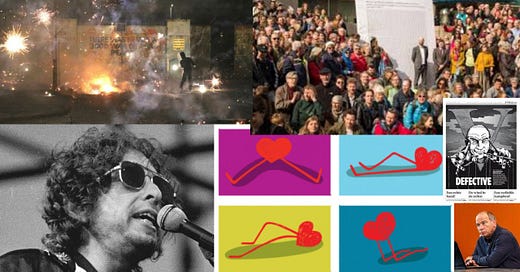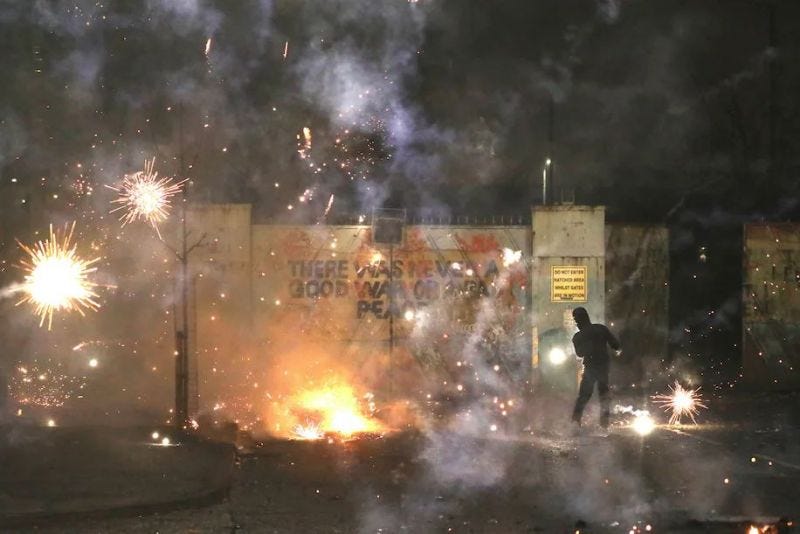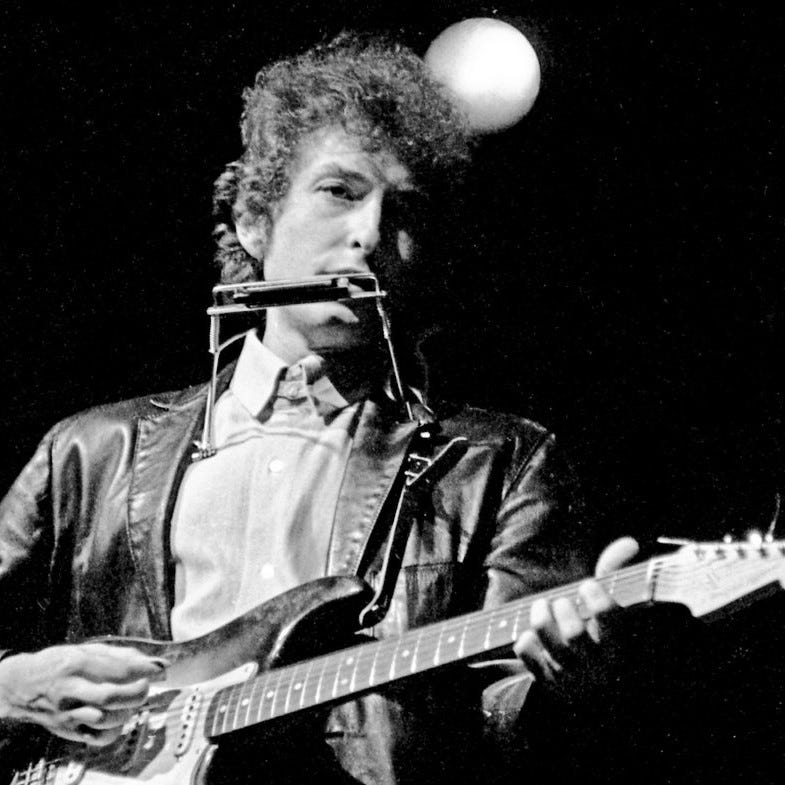Unlocked: Shell on trial, Bob Dylan's 80th, Belfast in flames, Dutch Sex Ed, and more
Free for one week only, six of the best 2ndOpinion posts from Q2, 2021
NOT MUCH happened in recent months of multi-party talks to form a new coalition government in the Hague - not that's worth remembering, at any rate. Here at 2nd Opinion, on the other hand, this second quarter of 2021 included some action-packed posts from business, politics and culture.
Shell, the Netherlands’ biggest company and a lodestar for the country’s outsized role on the world stage, was told by a Dutch judge to dispose of its most polluting assets to meet the goals of the Paris Climate Agreement. Similar litigation is likely to follow in other jurisdictions.
In Belfast, rioting on the Shankhill Road signalled distress among mainly Protestant communities in Northern Ireland over the terms of the Brexit deal between London and the European Union. The tensions among so-called ‘loyalist’ communities who blame the government in London were a problem in Brussels too.
Then in May, Bob Dylan - rockstar, troubadour, poet and Nobel laureate - turned 80: the protest singer’s long efforts to shake the mantra of being “the voice of a generation” have created a legacy of classical proportions. My post on the confessions of a Bob-cat was the most-read on 2nd Opinion to date.
In the Netherlands, opinion pollster Maurice de Hond took issue with a chart-topping Dutch podcast, the Deventer Mediasaak. The series exposed dark arts and behind-the-scenes media manipulation. De Hond successfully cast doubt on the verdict in a murder case despite evidence that the guilty man had been duly convicted.
In a guest post, special correspondent Betsy Middleton peered into the prejudices of sex education in Dutch schools. This is the kind of teaching that policymakers, with their grown-up attitudes to sex, might be expected to manage well. The secular state takes a 'sexular’ approach to straight-talking about sex, but some stubborn stereotypes persist.
While those secretive talks to form a new government dragged on in the Hague, a “leaked” plot set out a blueprint for a circular economy that sounded, well, too good to be true. Its ambition jarred with “the victim role” to which right-wing parties in the Netherlands are firmly attached, commented a “source” on LinkedIn.
Free for one week only
All six posts are free to read in the online archive from July 3-11, 2021. Just click on the links in the summaries below. After that, the locks click shut again - except to subscribers, who can browse the entire archive including art and short films at any time. Big thanks from me to all of you for supporting this newsletter.
Please share and tell your friends.
An earthquake under Big Oil
THIS IS A POST I’d half-expected to write one day - not just yet. In my day job, I work closely with activist shareholders in oil and gas. I’ve watched many big investors in these companies begin to reckon with the contradictions of an energy system that poses a material threat to their other assets.
Fossil fuels have powered our prosperity, mobility and standards of living since the 19th century; but nobody seriously disputes that their days are numbered. Capital markets are re-calibrating the principle of ‘fiduciary responsibility, the foundational concept that governs the legal liability of investment professionals to the clients whose money they manage.
The real issue for debate is how long that energy transition to renewable will take, before obstacles to the rapid scaling of new energy infrastructure can be removed. Fund managers can no longer discount the economic damage to investment portfolios caused by carbon emissions.
Shell must reduce its CO2 emissions by 45% within 10 years: the interest served with the reduction obligation outweighs the Shell group’s commercial interests and may curb the potential growth of the Shell group - Judge Larisa Alwin
On May 26, a judge in the Hague ruled that Shell is liable for its contribution to global heating caused by emissions. The verdict was "a turning point in history,” said Roger Cox, an environmental lawyer acting for Milieudefensie (Friends of the Earth Netherlands).
The case - brought by Milieudefensie with 17,000 co-plaintiffs and six other Dutch organisations (ActionAid Netherlands, Both ENDS, Fossil Free Netherlands, Greenpeace Netherlands, Young Friends of the Earth Netherlands and the Wadden Sea Association) - marks the first time that a Dutch court has ordered a private company to comply with the Paris Climate Agreement.
Judge Larisa Alwin found that Shell must reduce its CO2 emissions by 45% within 10 years. The case will go to appeal, but the lower court ordered the company to act immediately - a decision, she acknowledged, that could have “far-reaching consequences” and may “curb the potential growth of the Shell group”.
The verdict coincided with a spate of shareholder rebellions at oil companies’ annual general meetings, in Europe and the US. In a perfect storm of precedents, the International Energy Agency called for a ban on development of all new oil and gas projects.
Read the full post here: An earthquake under Big Oil
A border buried at sea
TWENTY-THREE YEARS after the Good Friday Agreement ‘succeeded’ in blurring the grievances of both sides in Northern Ireland, rioting on the streets of Belfast became the most obvious symptom of tolerance frayed.
In the Shankill Road area, at least 90 police officers suffered injuries from youths armed with rocks, Molotov cocktails and (though it hurt no one) a burning bus. The real culprit in the eyes of most Dutch commentators was Brexit. Northern Ireland had been thrown back in time - teruggeworpen in de tijd, warned Trouw’s editor-in-chief.
The rioters were mostly teenage boys, allegedly loyal to Protestant factions which demand “full equal” treatment - volledig gelijke behandeling - for Northern Ireland within the United Kingdom. Brexit had made this aspiration impossible: Door de brexit is dat echter niet meer mogelijk.
Shankill Road is a locus of Ireland’s so-called Troubles, a kind of Berlin Wall for the Northern Irish capital. Every night, the thoroughfare between traditionally Catholic and Protestant strongholds is barricaded by locked metal gates. By day, the gates are opened and life goes on.
Precise grievances to explain the rioting were harder to discern. In Volkskrant, Patrick van IJzendoorn argued that allegations of preferential treatment of nationalists by police had provoked unionists. But a new European border in the Irish sea was the deeper cause of their isolation and despair.
A catalyst was prosecutors’ refusal to pursue massive breaches of coronavirus regulations by more than 2,000 republican sympathisers. Northern Ireland’s deputy first minister, Michelle O'Neil, was among their ranks at the funeral in June 2020 of Bobby Storey, a former Irish Republican Army operative who became northern chairman of its political wing Sinn Féin after more than 20 years in prison for terrorist offences.
An alternative trigger could have been a police crackdown on the illegal drugs trade involving criminal networks on both sides of the sectarian divide, cited in an insightful podcast by Rory Carroll, Ireland correspondent for The Guardian.
To this still parochial picture, Van IJzendoorn added a lucid analysis of the European dimension. Brexit negotiators on both sides feared a resumption of republican violence if a new border was installed on the mainland of Ireland and Northern Ireland, so the eventual compromise was to locate Europe’s newest border in the Irish Sea.
In the unionist mind, a perception had taken root that nationalists are in charge of Northern Ireland - de nationalisten het voor het zeggen hebben in Noord-Ierland. Next to longstanding mistrust, the new and unstable element was a border buried at sea.
Read the full post here: A border buried at sea
A voice like sand and glue
A RECENT ARTICLE in Britain’s Daily Telegraph by Neil McCormick, the paper’s pop critic, began: “We live in the age of Bob Dylan”. From the house journal of British conservatives, that’s a measure of improbable reach and reputation. In a career spanning six decades, Dylan has never shaken off the prophet's mantle he refused as a young man.
It’s the fans, the self-described Bob-cats, who suffer the consequences. For the best part of a decade, Dylan refused even to greet the audiences who flocked to see him. That ambivalent relationship dates at least from his cutting references to the scribes, pundits and writers in Ballad Of A Thin Man (1965):
You walk into the room with a pencil in your hand / You see somebody naked, you say: who is that man? / You try so hard, but you don’t understand / Just what you will say when you get home. / Something is happening here, but you don’t know what it is / Do you Mr Jones?
Dylan is a captivating but routinely unreliable narrator. In a recording sampled for Verbatim, a remarkable new BBC radio documentary, he could be heard elaborating long ago on his process. Songs need “structure, strategems, codes and stability,” he said. De-coding those strategies can be a life’s work for diligent Bob-cats.
Dylan shifts mode within a single song: “Someone’s got it in for me, they’re planting stories in the press,” he growls in the opening to Idiot Wind (1975). Its waspy, vituperative howl warms into a ballad, then resolves in a healing note of (possibly) Christian redemption:
There’s a lone soldier on the cross, / smoke pouring out of a box car door. / You didn’t know it, you didn’t think it could be done / but in the final end we won the war / after losing every battle
Fame is a core concept in Dylan’s life-long performance. “Everybody who does my job exists in the shadow of Bob Dylan,” songwriter Steve Earle told GQ magazine, “There are two categories: Dylan and everybody else. It's as simple as that, and it's going to be that way until he dies”.
In 2000, admiring Dutch Bob-cats gathered in Amsterdam to advocate for a Nobel prize with a mix of karaoke, idolatry and learned discourse. How else? Every rock star is preoccupied with his or her own shape-shifting persona: that’s the job, how could they not? But the epochal and prophetic dimensions of Dylan's meta-celebrity make the price of fame for him somehow different.
Read the full post here: A voice like sand and glue
Trial and re-trial by media
IN DEVENTER, a municipality of just more than 100,000 inhabitants in the Netherlands’ southwest province of Overijssel, lived a handyman by the name of Michaël de Jong. This man had nothing to do with the murder of his friend Jacqueline Wittenberg.
A 60-year-old widow, Wittenberg was strangled and stabbed to death in her home in September 1999. The crime made headlines, then predictably vanished from the news. A year later, Ernest Louwes, Wittenberg’s tax adviser, was convicted of the murder and sentenced by the court in Arnhem to 12 years in prison.
A knife, discovered by a police dog and linked to Louwes, was said to be the murder weapon. The verdict was reported in the media, and the story again disappeared from the news.
Until 2003, when a case review uncovered flaws in the investigation. Results from an odour test turned out to be incorrect: the knife was not the murder weapon. The Supreme Court referred the case for a re-trial. The review followed serious flaws in other investigations, notably a wrongful conviction in the murder in 2000 of a 10-year-old girl in Schiedam, and the Putten murder case in 1994 when two men were falsely accused of killing an air stewardess.
Convinced that Louwes was innocent, supporters rallied to cast doubt on his conviction. Chief among the sceptics was a well-known media figure, opinion pollster Maurice de Hond, who became involved with the campaign to acquit Louwes in 2005. Investigators had paid too little attention to De Jong, he argued. The pollster pointed a finger at the handyman.
So began the Deventer Mediasaak, the case of the Deventer media, a podcast that soared to the top of Apple’s podcast chart for the Netherlands. A seemingly simple murder case - een ogenschijnlijk eenvoudige moordzaak, degenerated into a people's judgement - een volksgericht, wrote Menno van Dongen in Volkskrant.
Read the full post here: Deventer murder: trial and re-trial by media
Dutch Sex Ed: secular, not ‘sexular’
Talking about sex sounds like the kind of thing that Dutch people, known for their no-nonsense pragmatism and ‘directness’, would do well.
Alas, not, wrote Betty Middleton in this guest post for 2nd Opinion.
The Netherlands is famous for its uncomplicated approach to sex, an attitude reflected by a corresponding savviness in public policy. Prostitution is regulated and taxed. The Dutch were first to legalise gay marriage in 2001. Amsterdam, especially, enjoys a global reputation as the gay capital.
All this could augur well for Sex Ed in schools, a section of the curriculum where public policy meets the private belief systems of family, religion and personal sexual preferences.
In theory, according to Rutgers Institute, a foundation, teaching young people to think about the context of their own and others’ ways of life can prepare them “to respectfully deal with sexuality and diversity within society, including sexual diversity” - leert respectvol om te gaan met seksualiteit en met diversiteit binnen de Samenleving.
With the exception of Muslim girls, girls talk a lot more about sex than boys - Lang Leve de Liefde, handbook for schools
In practice, what happens in classrooms often reflects less high-minded perceptions of cultural, ethnic or religious identity. A recent study of two high schools found both emphasised or ignored issues of homosexuality and virginity, effectively reinforcing ethnic stereotypes.
In ethnically diverse classes, teachers routinely gave greater emphasis to lessons on virginity and sexual diversity. The same issues were often neglected in predominantly white classes. One teacher dismissed a homophobic incident between two boys as “just kids being young”.
Freed from the influence of Christian conservatism, Dutch society grew suspicious of socially conservative influences - especially Islam - from immigration
A handbook widely used in Dutch schools, Lang Leve de Liefde - Long Live Love, ascribed social behaviours to religious and sexual identities: “With the exception of Muslim girls, girls talk a lot more about sex than boys” - met uitzondering van Islamitische meisjes praten meisjes veel vaker over seks dan jongens.
Read the full post here: The double-Dutch standard in Sex Ed
A wafer-thin plan
Whether the next cabinet is Rutte’s fourth - Rutte IV, or D66 leader Sigrid Kaag’s first as prime minister, Kaag I - the scope for bold policy changes is wide open. Not least as a consequence of the burgeoning public mistrust of authorities, fuelled by the Covid-19 pandemic.
The hard bargaining to form a new coalition was happening - as usual - behind closed doors. Rutte deployed Herman Diederik Tjeenk Willink, a 79-year-old former civil servant-turned Labour party politician, in the role of informateur with a brief to rebuild trust between the cabinet and parliament after a string of scandals.
Willink’s interim report set out principles to inform the ongoing multi-party talks. And his advice? In a nutshell: Keep it short. He urged a “wafer-thin” coalition agreement - een flinterdun coalitieakkord.
By sticking to the bare outline of four or five major issues, reported public broadcaster NOS, parties could sidestep the kind of hard-won compromises baked-in to previous coalition pacts. The potential downside - een keerzijde - to Willink’s “wafer-thin” formula is that the same deep scepticism evident in society will infuse parliament.
A growing risk, wrote Natalie Righton in the Volkskrant, was that every possible solution would be negotiated endlessly in the House - het risico groeit dat later in de Kamer over elke mogelijke oplossing eindeloos onderhandeld gaat worden. The biggest hurdle for coalition-builders was to turn points of consensus into grounds for optimism.
On LinkedIn, a post by the circular economy pioneer Guido Braam touted a “man on the moon mission” to unite the political factions. For the uninitiated, a circular economy mimics the basic operating principles of Nature, a source of new ideas for agriculture, climate, finance, housing, industry, labour markets and foreign policy.
Sharing a link to an open and collaborative draft policy in Google docs, Braam revealed the draft of a coalition agreement with the working title Een Circulaire Economie die Verbindt - A Circular Economy That Connects. Its advocates proposed an economy of ‘closed loops’ and zero-waste sustainable systems, operating within planetary boundaries.
Read the full post here: A wafer-thin plan
READ MORE
Kenneth Kaunda: the last of the first
Zambia’s leader was the last survivor among Africa’s founding fathers
Dutch activists bring climate targets to US oil majors
Green light from Wall Street regulator signals ‘clean break’ from Trump era
A revolutionary court for the world
Litigants are pushing Dutch judges to act against governments and polluting companies which defy the Paris Climate Agreement








